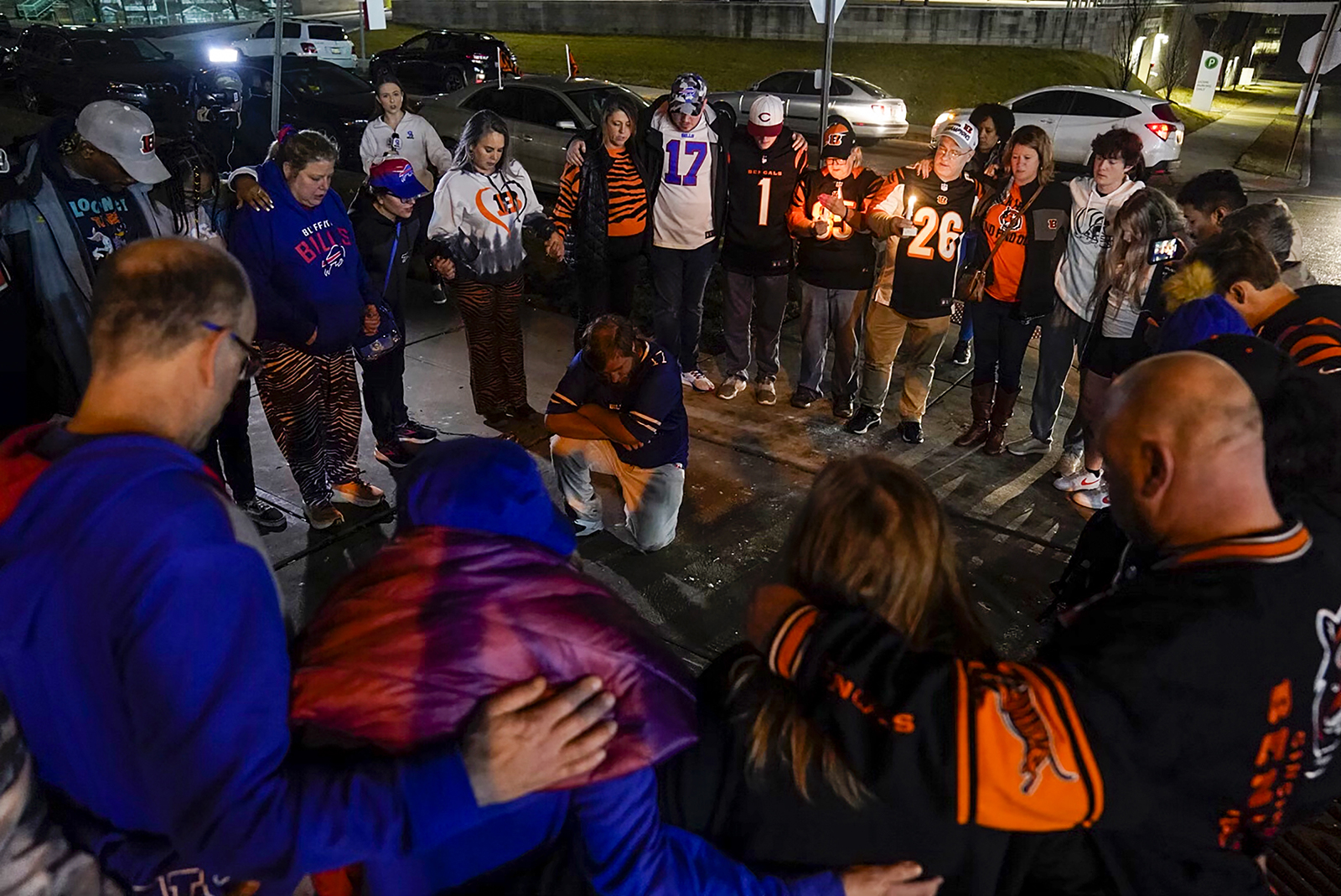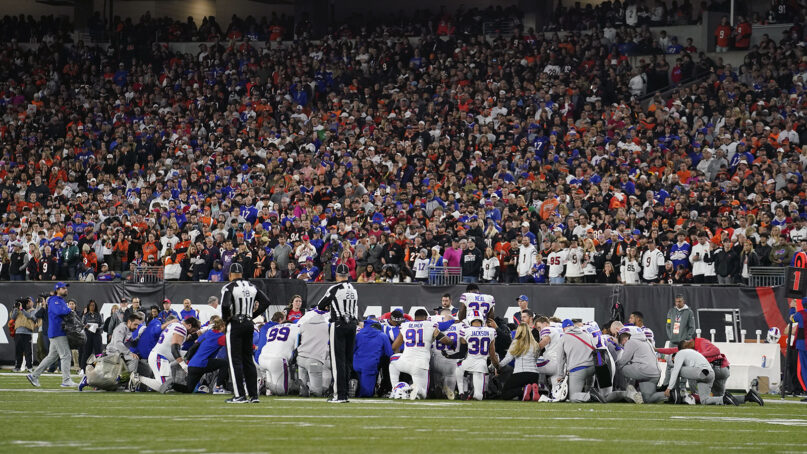(RNS) — I am a hospital chaplain who cares for surgery and trauma patients and their families. I’m also an NFL fan who prayed fervently for Damar Hamlin, the 24-year-old Buffalo Bills safety who collapsed on the field after tackling a member of the opposition Cincinnati Bengals on Monday night (Jan. 2).
My interest in football and health is also academic. I recently finished teaching three courses at Texas Christian University, including “Religion, Health and Meaning.” In that class, attended by at least one TCU football player, we had discussed the neurological dangers of the sport, especially chronic traumatic encephalopathy, the brain damage suffered by many former NFL players, and the ways Christian faith informed the research of Bennet Omalu, the neuropathologist most responsible for bringing CTE to public attention.
These experiences have given me a particular sense of how faith intersects with football, and how football often functions as a kind of faith in American culture.
Two nights before the Bills-Bengals game, my wife and I went to a pub in Fort Worth to cheer on the hometown Horned Frogs of TCU, my wife’s alma mater, as they faced the heavily favored University of Michigan Wolverines in the college football semifinal playoff.
When the Horned Frogs upset the Wolverines, we celebrated with the pub’s other patrons as if they were kin, not strangers whom we had just met. The high-fives we exchanged were more enthusiastic than the perfectly pleasant but less joyous handshakes we offered our fellow congregants in church the next day.
This sacred shared bond that football can engender was present after Hamlin’s collapse. Players from both teams dropped to their knees in prayer and huddled tightly around Hamlin and the first responders on the field to shield their medical efforts from public view.
Among the well-wishers on social media as the emergency went on were notable religious Americans. Bernice King, daughter of Martin Luther King Jr., was moved to say, “I am praying for Damar Hamlin. My heart goes out to his family and teammates. The response of both teams reminds us that we are so connected as human beings. We matter to each other.”
Scenes of fans of the opposing team making a kind of compassionate pilgrimage to the hospital in Cincinnati where Hamlin was rushed for critical care also remind us that sports do more than simply incorporate the faith of players and fans. In such harrowing moments, sports can function like a religion itself, creating meaningful community that offers solace in times of suffering.

Fans gather outside of University of Cincinnati Medical Center, late Jan. 2, 2023, in Cincinnati, where Buffalo Bills’ Damar Hamlin was taken after collapsing on the field during an NFL football game against the Cincinnati Bengals. (AP Photo/Jeff Dean)
But the mutual care that Damar Hamlin’s collapse brought out also makes me wonder whether I can in good conscience ever return to celebrating football again.
Consider how the initial concern showed for Hamlin was mixed with interest in getting the game underway again. The game between the Bills and Bengals was eventually postponed, but in the first minutes after Hamlin collapsed, word came that the teams were being told they would have five minutes to warm up before recommencing play.
Many commentators offered prayers, sometimes tearfully, for Hamlin, but Fox Sports commentator Skip Bayless, a self-professed Christian, soon let his focus stray to the NFL schedule. “No doubt the NFL is considering postponing the rest of this game — but how? This late in the season, a game of this magnitude is crucial to the regular-season outcome,” he wrote on Twitter, before catching himself and saying the outcome “suddenly seems so irrelevant.”
(Bayless has shown his insensitivity before. When, in 2020, Dallas Cowboys quarterback Dak Prescott responded to his brother’s suicide by acknowledging his own mental health battles during the pandemic, Bayless criticized Prescott on air for showing “weakness.”)
Bayless’ reaction, however, made me examine my own culpability, if on a much smaller scale. I too can quickly forget my concern about a player who has left a game with a concussion and return to my interest in the outcome of the contest. When it comes to the intrinsic sacred dignity of these players, I too sometimes have a short-term memory.
If football operates as a kind of religion that cultivates life-giving connections, it can also foster attitudes that make players seem like disposable commodities. Nothing brought this home more than than those few minutes when, watching from the sofa, my wife and I squirmed, looking at each other incredulously, as we heard that the players would be expected to play on.
We had just watched these men pray for a teammate who received extended rounds of CPR. Now those players, who had to be still emotional, were being asked to abruptly change course and breathlessly return to activities that they had been painfully and viscerally reminded can produce traumatic consequences.
My wife broke our icy silence with a decidedly profane assessment that in essence said, “Screw this sport.”
(The Rev. Sean Samuel O’Neil, who holds a doctorate in religion, is the author of “Spirit and Sport: Religion and the Fragile Athletic Body in Popular Culture.” He is also a hospital chaplain at Texas Health Harris Methodist and a pastor at Kyrie Pub Church. The views expressed in this commentary do not necessarily reflect those of Religion News Service.)





